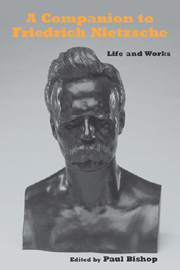Book contents
- Frontmatter
- Contents
- Acknowledgments
- A Note on Editions and Abbreviations
- Introduction
- Link to Nietzsche's Early Writings
- Link to The Birth of Tragedy
- Link to Untimely Meditations
- Link to Human, All Too Human
- Link to Daybreak
- Link to The Gay Science
- Link to Zarathustra
- Link to Beyond Good and Evil
- Link to On the Genealogy of Morals
- 9 On the Genealogy of Morals
- Link to The Case of Wagner and Nietzsche contra Wagner
- Link to Twilight of the Idols, The Anti-Christ, and Ecce Homo
- Link to the Nachlass
- Conclusion
- Notes on the Contributors
- Index
9 - On the Genealogy of Morals
from Link to On the Genealogy of Morals
Published online by Cambridge University Press: 05 February 2013
- Frontmatter
- Contents
- Acknowledgments
- A Note on Editions and Abbreviations
- Introduction
- Link to Nietzsche's Early Writings
- Link to The Birth of Tragedy
- Link to Untimely Meditations
- Link to Human, All Too Human
- Link to Daybreak
- Link to The Gay Science
- Link to Zarathustra
- Link to Beyond Good and Evil
- Link to On the Genealogy of Morals
- 9 On the Genealogy of Morals
- Link to The Case of Wagner and Nietzsche contra Wagner
- Link to Twilight of the Idols, The Anti-Christ, and Ecce Homo
- Link to the Nachlass
- Conclusion
- Notes on the Contributors
- Index
Summary
FROM HIS YOUTH NIETZSCHE WAS CONCERNED with the problem of German culture and the possibilities for cultural renewal. In his early work his hopes for renewal centered on Wagner and the rebirth of a tragic age out of the spirit of (Wagnerian) music. After his break with Wagner, he gave up the idea of an immediate transformation of culture through a public festival or performance, and sought instead to provide the foundations for a new European cultural elite. This vision of cultural renewal gave way after 1881 to a more apocalyptic notion of cultural transformation that he connected to the advent of nihilism, the idea of eternal recurrence, the figure of Zarathustra, and the “Great Noon” (der grosse Mittag; ZI 22 §3; KSA 4,102). Nietzsche was convinced that the Christian values that had guided European humanity for the last 1,500 years had become unbelievable. Present-day Europeans had to make a fateful choice between the last man and the superman, between a consumer-oriented, utilitarian society dedicated to universal happiness like that of Denmark or America, or a higher but tragic culture with superhuman possibilities. In this final period of his thought Nietzsche became convinced that these superhuman possibilities depended on the proclamation of the doctrine of eternal recurrence. He believed this doctrine was essential because it was the only way toward a positive future free from resentment and the desire for revenge.
- Type
- Chapter
- Information
- A Companion to Friedrich NietzscheLife and Works, pp. 255 - 278Publisher: Boydell & BrewerPrint publication year: 2012



